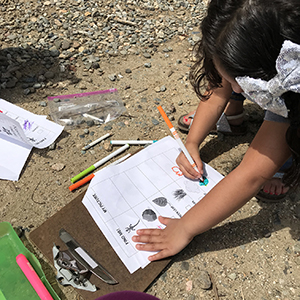How to Get Them Up from the Screens
BY SUKI WESSLING
 In normal times, our kids are using screens way too much.
In normal times, our kids are using screens way too much.
These aren’t normal times.
I love the Internet and all it has given us, but as a parent, one of the things I am concerned about is when activities on screens replace healthy, real-world activities. These activities are the antidote to screen use, and involve moving the body, changing eye focus between long and short distance, developing complex fine motor skills, and social interaction.
In other words, all the things our kids do when they are in classes, playing with friends, being creative, and just out in the world.
Maybe we can take some hints from OT. Occupational therapists treat children with deficits that result in learning or behavioral challenges.
“We look at developmental areas that support higher learning and higher skill levels,” explains Keri Allen of the Pediatric Therapy Center. “If we see a child with delays in an occupation like writing or ball-playing, we might break that down and look at developmentally where they are struggling.”
OTs come up with fun and stimulating “exercises” for kids with deficits, but those activities can easily be translated for kids who need a screen antidote.
“These are areas that typically are developing as we learn through play and exploring the world,” Keri explains. She also points out that this isn’t just for younger kids. “I’m seeing it even more so with the teenagers—they’re having to be online for more time. Also, a lot of their movement comes from organized sports, where younger kids might be more used to having movement opportunities in education.”
Gross motor movement
Kids need to move! OTs break this down into a number of areas, including bilateral coordination, crossing the midline, and upper body strength, but what parents need to know is that kids should be doing big, varied movements.
Look for activities that feature varied movements, such as:
- Climbing
- Lifting
- Using hands and feet at the same time
- Cross-body movements
- Keri recommends car-washing, fort-building, and obstacle courses.
Fine motor control
Your kids do get some fine motor control experience on computers. Typing and gaming both develop the brain for certain fine motor activities. But there are plenty of other fine motor skills that lie dormant as kids gaze at screens.
Look for fun activities that your child enjoys that require small hand movements, such as:
- Using scissors
- Origami
- Coloring pages
- Separating and sorting small objects
- Hand-eye coordination
At a time when our students are spending hours without shifting their focus, it’s especially important to move in intentional ways. Keri particularly recommends balloon play because it slows down the process and forces kids to move in an organized way. Get your kids involved in silly activities that require them to watch and move, such as:
- Balloon games
- Pool noodle games
- Throwing and catching
- Sensory processing
Working on a computer is a uniquely sensory depriving activity. When our students attend online classes, they pause their interaction with the sensory world. OTs split sensory activities into a large number of subgroups, such as vestibular, proprioceptive, tactile, and auditory. Without being too worried about which category any particular activity falls into, consider offering up strong sensory activities such as:
- Clay, slime, sand, and other mushy, gritty, pliable substances
- Smelling and tasting
- Making music
- Self-help skills
More than any generation of parents, we love to try to keep our kids from hardship. But the human organism thrives on being useful and productive. If you are all stuck at home together, take this time to ask your children to learn new skills—and improve their physical and mental health at the same time. Think of important life skills such as:
- Doing laundry
- Taking out the garbage
- Cooking
- Integrated activities
The best activities are fun and integrative: your kids won’t even know that they’re learning. More complex activities integrate planning, movement, and sensation, but looks like simple family fun to the kids who are benefitting from it. Consider putting together integrated activities such as:
- Meal planning and cooking (let your kids run a restaurant!)
- Scavenger hunts complete with map-making and running around
- Making forts and battling it out with foam swords
Remember that everything you do with your children affects them in a variety of ways, from their intellectual development to their mental health.
“There’s so many components that support our learning, whether it’s keeping your arousal level up or activating your muscles or getting the fresh you need or keeping circulation going,” Keri points out. “Also, for your overall emotional health as well, if you’re sitting for long periods of time you don’t feel that great about yourself. I hear about my kids getting depression and feeling really down. You generally feel better after some movement or tactile experience to keep you more alert.”
Teleschooling may currently be a necessity, but we can do a lot to create balance in our kids’ lives, one batch of slime at a time.
Resources:
The Pediatric Therapy Center offers activity ideas on their blog at ptc-sc.com/blog
Youth Programs @ Home from Cabrillo College Extension offers culinary, creative arts, science & engineering, computers and technology, leadership & academic enrichment: cabrillo.edu/services/extension/youthreg.html
The Santa Cruz Public Library is features storytime events online: santacruzpl.org/
County of Santa Cruz Parks & Rec offers Craft of the Week: scparks.com/
City of Santa Cruz Parks & Rec offers Virtual Recreation: cityofsantacruz.com/government/city-departments/parks-recreation
Santa Cruz Arts Council Arts Learning at Home:
artscouncilsantacruzcounty
artsathome.weebly.com/
Online volunteer opportunities from the Volunteer Center: scvolunteernow.org/athomevolunteer
Yvette of the Art Factory puts out videos on her Facebook page, telling stories and guiding kids in art projects: facebook.com/The-Art-Factory-112370182141009/
West Performing Arts and All About Theatre have moved their classes online: westperformingarts.com/ and allabouttheatre.org/







One Comment
Linda M Stephenson
Excellent article. Terrible art. Why would you choose to illustrate an article promoting big, healthy activities with an example of the worst sort of tedious busywork typically inflicted on kids by the worst public schools.